- Home
- Lin Carter
Thongor at the End of Time
Thongor at the End of Time Read online
PAPERBACK LIBRARY EDITION
First Printing: October, 1968
Copyright © 1968 by Paperback Library, Inc.
THONGOR AT THE END OF TIME
is dedicated to
John Jakes, Roy Krenkel, and Roy Langbord
Kojans of the Empire
Paperback Library books are published by Paperback Library, Inc. Its trademark, consisting of the words "Paperback Library” accompanied by an open book, is registered in the United States Patent Office. Paperback Library, Inc., 315 Park Avenue South, New York, N.Y. 10010.
THONGOR AT THE END OF TIME
For seven nights Mardanax, the masked magician, has readied himself for his revenge on Thongor. The crypts and catacombs beneath the palace have witnessed many grim and terrible scenes of torment and punishment, but none so awful as the black rites wherewith the Black Druid prepares himself for the hour of his triumph. Each dawn the rushing waters of the Twin Rivers bear out to sea the obscenely mutilated corpses of certain slaves from whose skin the telltale ownership mark has been removed—pitiful cadavers whose life-force, brutally torn from agonized flesh, has been offered up in sacrifice to the Triple Lord of Chaos.
NOW MARDANAX STRIKES—AND THONGOR FALLS LIFELESS!
The First Book: THE MASKED MAGICIAN
“. . .Greatness came upon Patanga the City of the Flame in the days after Zaar of the Magicians was whelmed and trodden down in ruin beneath the Unknown Sea; and in the fullness of time six proud cities came to stand under the black-and-golden banners of Thongor the Mighty, and lo! the gods were pleased. But that grim and unappeasable Fate that triumphs even over the gods and is not swayed by the splendor and power of kings, smote the Warrior of the West with the strangest of dooms, and the jaws of Death gaped wide to engulf his unconquerable spirit. . . ."
—The Lemurian Chronicles, Book Five, Ch. i.
Chapter 1: THE BLACK-ROBED ONE
The gods inscrutable and old
With vision that can scan the past
And know what dim tomorrows hold,
Bring Thongor down to death at last. . . .
—Thongor’s Saga, Stave XVIII
Thongor the Mighty clutched at his throat. He swayed, staggering, as he stood there at the high altar in the great temple of his royal city of Patanga. His breast heaved, his lungs labored, panting for air. With one hand he tore away the rich embroidered robes of state, baring his panting chest whereon a small amulet of green paste dangled on a thong about his corded throat. He fought against the numbness that spread like icy venom through his veins—strove to beat back the swirling crimson mists that fogged his vision. As the light thickened about him, he could see dimly through the gathering shadows the astonished faces of his lords and captains, courtiers and nobles—among them, the white face of his lovely mate, Sumia, and the frightened features of his young son, Prince Thar. Noon sun struck splendidly through the thronged temple where his entourage was gathered to watch the Lord of the West conduct the spring offering to the gods.
Instead, they saw a different kind of offering. . . .
Then his strength failed him, and he fell sprawling down the marble steps to lie like a dead thing at the base of the altar. Shouts rang out and women shrieked in the terror and confusion. Old Lord Mael, one of the chief peers and advisors of Thongor, was standing to the forefront of the crowd and was thus the first to reach the side of the fallen king. He laid his ear against the motionless chest of the barbarian, then examined the body with shaking hands. When he lifted his face to Sumia Sarkaja, his bluff and hearty visage was grimly pale, shadowed with loss.
The young queen stood with her slim arms about the prince her son, comforting the frightened boy. She did not need Mael’s hesitant words to know that her savage and kingly mate was dead.
But this is not the beginning of the tale. For that, we must turn back the pages of the Book of Time to a moment some fifteen days before these events came to pass. The place is the great West Gate of Patanga. It is the hour after dawn. For here the mighty tale of Thongor' s most awesome and fantastic adventure truly begins . . .
It was early one morning in the spring of the Year of the Kingdoms of Man 7017. Charn Thovis, the young Otar of the Black Dragons who had saved the life of Thongor three years before during the ambush at the Hills of the Thunder Crystals, had risen with dawn as was his wont. Thongor had rewarded his courage with the captaincy of a hundred warriors and ennobled him as a kofan of the empire. Thus he resided in the Palace of a Hundred Sarks whose towering mass of masonry rose on the Thorian Way, that mighty avenue that ran from the Great Plaza at the center of the gorgeous metropolis to the soaring bastions of the West Gate. Thither he strolled this morning as the gold sun of ancient Lemuria rose above the edges of the world and flooded all the land with light.
He was a tall, lithe-limbed young warrior, this Charn Thovis, his tanned and lean and powerful body half-bared in the Lemurian harness of black leathern straps, the coveted dragon emblem blazoned on his accouterments and swordhilt. He had a strong-jawed, clean-shaven face with clear gray eyes and straight black hair worn close-cropped. His boot heels rang on the stone pave as he strode through the streets. A vast black cloak belled from his broad shoulders and sunlight glittered on the gems he wore at armlet, girdle and hilt.
The towering gates of Patanga were swung asunder with dawn, for the mighty Spring Rites were near and already lumbering zamphs dragged massive wains laden with grain and fruit and produce from the outlying farms to market in the famed bazaar of the City of the Flame. Through the gates of the walled city streamed a motley horde. Fanners and peasants on their way to market. A wandering bard; a juggler or two. Here rode a cloaked warrior astride a lean, swift-pacing kroter, whose reptilian scales caught the morning sun and glittered. There the veiled palanquin of some lord or ambassador to the court of the mighty Lord of the West swung on the broad shoulders of Rmoahal slaves with gems in their ears.
And here and there among the others strode young men in war-harness, with swords at their sides or bows and quivers strapped across their shoulders—youths gray with road dust, weary and athirst, come hither from this or that of the Nine Cities of the West. From Zangabal or Pelorm or Shembis they came, from Tsargol and Cadorna and Thurdis the Dragon City, drawn to Great Patanga by the magic of Thongor’s name and the legend of his mighty deeds. And Charn Thovis smiled to see them, for not too many years ago he had been one of their number, a youthful chanthar or warrior from distant Vozashpa to the East, scion of an ancient family of honorable descent now fallen on lean times. Hither had he come across half a world, to break with the past and pledge his sword to the great hero-king of the age, Thongor of Valkarth, Lord of the Six Cities.
Well, the lads would find their place among the legions of Imperial Patanga, either in the Host or perchance, if fortune favored them, among the Patangan Archers or the newly formed Air Guard, whose sparkling and silvery flying boats circled tirelessly in the fresh morning sky above the mighty city; or even in that most honored of all regiments, the Black Dragons, who were vowed to defend the life and body of their lord the Sarkon, his bride the Sarkaja, and the young Jasark their son. Room there was in the mailed legions of the City of the Flame, for although Thongor had wrought mightily in the nine years since he had risen to the throne beside the woman he loved, and though four cities of his foes had fallen before him in war, and the empire had grown vast and strong and without peer in all the continent of old Lemuria, still jealous and powerful foes eyed Patanga and her glory with covetous eyes and plotted to bring her black-and-golden banners down into the dust.
Busied with these thoughts, Charn Thovis did not notice one unobtrusive limping figure who entered the city gates on the heels
of a clattering troop of spearmen mounted on great war-zamphs. He was bent and slow-footed as if old, supporting his weight by leaning on a tall staff. His lean body was wrapped in tattered and dusty robes of shabby black cloth, and a torn hood was drawn close about his bowed head as if to keep the morning sunlight from his face.
The man in black, however, noticed the young warrior as he stood watching the passing throng, and came limping over to where he stood beside a pylon whereon stone glyphs listed the long-gone triumphs of King Numidon who had reigned of old when Patanga was young. The warrior turned to survey the shuffling robed figure as it came near. From the condition of the ragged garments, much soiled with road dust and wear, he surmised the old fellow to be a beggar.
“I am sorry, old man, I came out without my purse this morning,” Charn Thovis said with a frank smile. “However, you will find charity for all at the palace gates where the city’s poor are fed. . . .”
The hooded man shook his head slightly and spoke in a husky voice scarcely louder than a whisper.
“An old man’s thanks to you, Highborn, but it is not your gold I ask, but your assistance. I seek the house of the Baron of Tallan, if you could direct me to it.”
“Indeed? Well, nothing simpler! This avenue is the great Thorian Way. Follow it to the Bazaar Square and take the Avenue of Sphinxes which goes south from the square into the Merchant’s Quarter; you will find the house you seek at the place where the avenue branches in twain, one branch going west to the Bazaar Gate and the other south through the quarter.”
The old beggar bowed his thanks and shuffled off, soon to be lost amidst the throng. Charn Thovis stared after him thoughtfully.
“Now by Karchonda, God of Warriors!” he said aloud, “that is truly an odd thing—”
“What is an odd thing, Charn Thovis?” a deep booming voice broke into his thoughts inquiringly. The young warrior turned to see the stalwart figure of a towering Rmoahal warrior in resplendent jeweled harness smiling down at him from his lofty height.
“Belarba, Shangoth,” he welcomed the newcomer with the familiar Lemurian word of greeting. “You are early risen!”
“No more so than yourself.” Shangoth grinned. The mighty Rmoahal, eight feet tall, bald as an egg, and indigo-blue of skin, was one of the great Nomad warriors of the remotest East, prince of the Jegga Horde whom Thongor had befriended eight years ago when adventuring on the Great Plains. Shangoth and several warriors of his princely retinue had accompanied the great Valkarthan back to Patanga to become members of his personal guard, and the brave Rmoahal with his simple barbaric dignity and deep-felt loyalty to the Lord of the West had swiftly made friends among Thongor’s chief nobles and guardsmen despite his strange appearance and amazing height. Shangoth repeated his query. “When I came up you were muttering something about an odd thing. What was it?”
Charn Thovis rubbed his jaw thoughtfully. “Oh, nothing, really. An old beggar just entered the gates as I was standing here. He inquired directions to the House of Tallan, which is somewhat puzzling. . . .”
“Why is that puzzling?” Shangoth asked patiently.
“No particular reason, it’s just—well, you perhaps do not know the Baron of Tallan, he rarely comes to Court for he is not very welcome there. His name is Dalendus Vool, a greasy toad of a man, noble in nothing save the tide he inherited by accident of birth. He is a member of the Old Nobility, and somehow managed to remain in good odor when Lord Thongor liberated the City of the Flame from the grasp of the Fire Druids. The Sarkon exiled most of the Old Nobility who had aided the cruel tyranny of the Druids, but there was no evidence against Dalendus Vool except an unsavory reputation. Anyway, I am puzzled that a beggar should seek out the House of Tallan, for I have never heard that Dalendus Vool was known for his charity—quite the opposite, I should have thought!”
Shangoth shrugged and laughed. “Well, if that is all you have to take up your time, vague suspicions of that nature, come—join me. Let us return to the palace. The day is young and we still have time aplenty for a brief workout with broadswords in the courtyard before the morning meal. Come—I will challenge you to a match!”
“And I will accept,” Charn Thovis responded with a grin, “although I know from experience that to face you for a quarter-hour with broadswords means I shall be sore and aching for the rest of the day!”
They strode away chatting amiably, and it was not until many days later that Charn Thovis had cause to remember his first meeting with the black-robed beggar.
The bent, hobbling figure in tattered and dusty robes limped and shuffled slowly along the Avenue of Sphinxes and reached by mid-morning the mansion of Dalendus Vool. It was a towering and palatial edifice whose ornate façade was rich with colored tiles whereon fantastic monsters capered amidst armorial bearings and geometrical designs.
The beggar made his slow and limping way to the rear of the mansion and entered through the kitchens. The delicious odors of cooking meat were thick in the smoky air and cooks bustled about decanting chilled wine and heaping trays of bright dewy fruit. Delicate pastries stood on a wooden table and meat pies were being drawn from steaming ovens by bare-chested apprentices—all this for one man, for as was well known, Dalendus Vool was a great gourmet who found his pleasure in the heavy-laden table and the well-filled winecup rather than in field of chase or in tourney or war.
So unobtrusive was the humble figure of the beggar and so quiet his entry into the kitchens that, for a few moments, no one even noticed his presence. It was not until the chamberlain, a fat-cheeked and over-important little man, came bustling into the room to demand word of the progress of the meal that the beggar was noticed. He goggled at the calm figure and his face reddened with fury.
“Who let this tatterdemalion in from the gutters?” he squeaked. “You there! About your business and quickly, or I’ll set the guard on you! If my lord were to know that street-beggars wander in and out of—of—” His voice wavered and died. His eyes goggled with astonishment and his red face paled swiftly.
Before his eyes the hunched figure straightened to its full height. Now the cold iron of aloof and kingly command radiated from the lean, black-robed form and eyes of lambent emerald flame blazed with cold malignant fires from the gaunt face whose features were shadowed and hidden by the close-drawn hood. Something in those weird flaming eyes—some unearthly power, some premonition of danger, chilled the very blood in the fat chamberlain’s veins. The man in black surveyed him contemptuously from his lean height, taking in the pale-faced, quaking figure with a sneer of vicious humor. His voice, when he spoke, was an evil silken purr, ominous and chilling.
“Go to thy master, dog, and say that his master hath come. Aye, one he and all the world thinks dead and drowned beneath the cold waves of Takonda Chann the Unknown Sea these three long years, but who hath ’scaped the holocaust, eluding the wrath of the barbarian dog, Thongor, and who yet lives to see the dog of Valkarth cold and lifeless in his tomb! Go, fool, and summon my slave Dalendus Vool unto the presence of the Black Lord.”
Terror was written plain to see in the chamberlain’s goggling eyes and sweat-smeared brow and loose, working lips, but he had learned ere now from the kiss of a whip not to disturb the baron without full cause, so he summoned from deep within him enough courage to quaver a single question. “What . . . name?”
The emerald eyes flashed with cold witchfires as thin lips moved to pronounce the dreaded name of one long dead. “Mardanax of Zaar!”
Chapter 2: AT THE ALTAR OF THE NINETEEN GODS
When great Zaar fell, one single man
Escaped the floods while all the rest
Went down to doom. ’Tis now his plan
To wreak black vengeance on the West.
—Thongor’s Saga, Stave XVIII
Three years before these events took place, the air armada of Patanga brought down to ultimate defeat Zaar the dead City of Magicians in the culmination of a mighty war between the free men of the West and the age-old Bl
ack City of the uttermost East. Armed with the new lightning guns devised by the great Nephelos, Iothondus of Kathool, the legions of Thongor wrought terrible destruction to the stronghold of evil sorcery, and breached the giant sea wall of black marble—loosing the titanic waves of Takonda Chann the Unknown Sea, which whelmed and crushed the Black City. Thus died the last of the Black Brotherhood who had long sought to gain ascendancy by their weird science and alien sorcery over the bright young cities of the West.
And in that cataclysm died the last of the Nine Wizards, those supreme and terrible masters of magic who had come perilously close to bringing the Kingdoms of Man beneath their iron tyranny. Made captive by superior force, dragged as helpless slaves into the grim jaws of the dark gates of Zaar, Thongor the Mighty and his friend Shangoth the great Rmoahal warrior had burst their bonds and brought crimson death to the Nine Lords of Zaar before the sky fleets struck from the cloud-veiled heavens. The great bronze war ax of the Nomad prince cut down Vual the Brain, Sarganeth of the Nuld, and Xoth the Skull. Thongor himself in a mighty duel slew the Red Prince, while the temple was collapsing under the assault of the flying ships of Patanga—burying under tons of masonry the corpse of Pytumathon, thus joined in death with Adamancus and Thalaba the Destroyer.
The world believed that Mardanax the Black Archdruid died in that holocaust. But in the howling chaos of the moment, while Thongor was battling against Maldruth the Scarlet, the Black Master of Zaar crept from his ebon throne and vanished through a secret door. Thence by obscure and hidden ways the masked magician fled his ancient city and escaped its terrible doom—but at a price. Shorn of his magical weapons and instruments, his powers weakened, lost or dispersed, alone and friendless in a hostile land where his great power was at last ended, Mardanax faced the grim task of making his way across half a continent filled with his foes. Somehow he had accomplished this mighty quest. The perils he surmounted, the dangers he eluded, the hazards he overcame could make a thrilling epic of adventure. But that tale shall go forever untold, for it is written not in The Lemurian Chronicles.

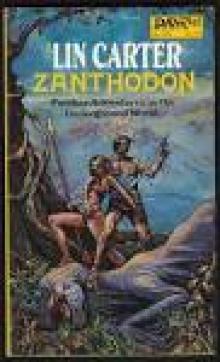 Zanthodon
Zanthodon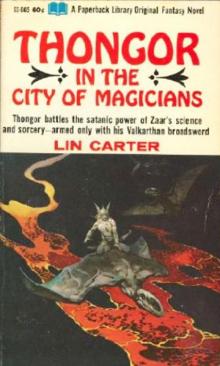 Thongor in the City of Magicians
Thongor in the City of Magicians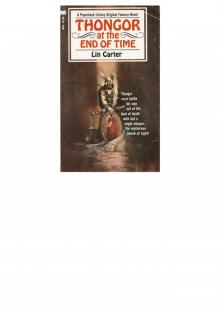 Thongor at the End of Time
Thongor at the End of Time The Valley Where Time Stood Still
The Valley Where Time Stood Still Journey To The Underground World
Journey To The Underground World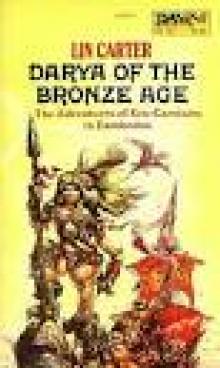 Darya of The Bronze Age
Darya of The Bronze Age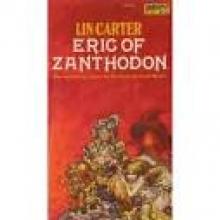 Eric of Zanthodon
Eric of Zanthodon Hurok Of The Stone Age
Hurok Of The Stone Age Tower Of The Medusa
Tower Of The Medusa Thongor Fights the Pirates of Tarakus
Thongor Fights the Pirates of Tarakus The Zanthodon MEGAPACK ™: The Complete 5-Book Series
The Zanthodon MEGAPACK ™: The Complete 5-Book Series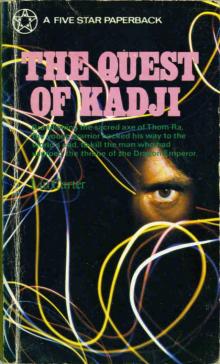 The Quest of Kadji
The Quest of Kadji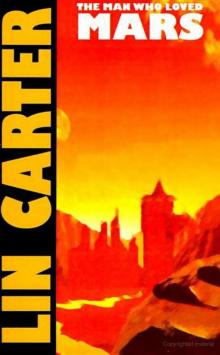 Lin Carter - The Man Who Loved Mars
Lin Carter - The Man Who Loved Mars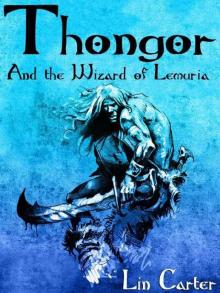 Thongor and the Wizard of Lemuria
Thongor and the Wizard of Lemuria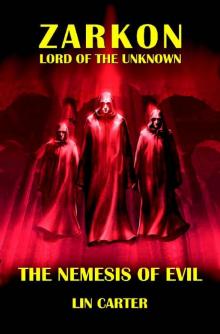 The Nemesis of Evil
The Nemesis of Evil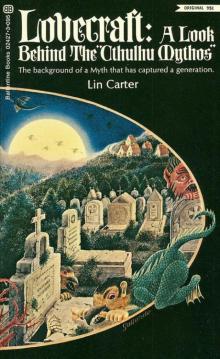 H.P.Lovecraft: A Look Behind Cthulhu Mythos
H.P.Lovecraft: A Look Behind Cthulhu Mythos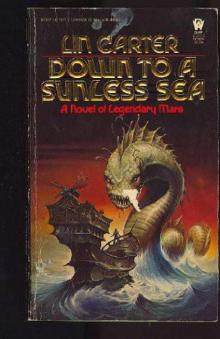 Lin Carter - Down to a Sunless Sea
Lin Carter - Down to a Sunless Sea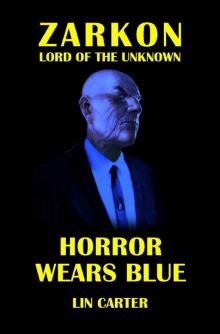 Horror Wears Blue
Horror Wears Blue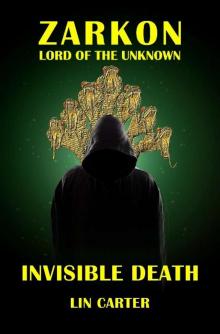 Invisible Death
Invisible Death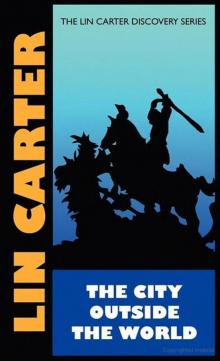 Lin Carter - The City Outside the World
Lin Carter - The City Outside the World The Volcano Ogre
The Volcano Ogre The Man Who Loved Mars
The Man Who Loved Mars